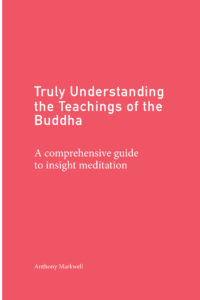 These Dhamma talks were given by Anthony during the silent 7-day vipassana retreat at Wat Kow Tahm, Koh Phangan, Thailand in August 2015. You can listen to the audio recordings on this page or download them as separate tracks. The full collection of the 16 talks is available for download as a bundle for off-line use. (zip/593MB).
These Dhamma talks were given by Anthony during the silent 7-day vipassana retreat at Wat Kow Tahm, Koh Phangan, Thailand in August 2015. You can listen to the audio recordings on this page or download them as separate tracks. The full collection of the 16 talks is available for download as a bundle for off-line use. (zip/593MB).
A complete transcription of the 16 talks is available as a book for free download:
“Truly Understanding the Teachings of the Buddha” (pdf/2.3MB). These transcribed talks follow the outline of a 7-day silent vipassana retreat. They are best listened to / read in sequential order as the topics address issues that unfold naturally as a retreat progresses. However you may, of course, listen to a single topic that interests you. The topics are listed below.
7-day Retreat Dhamma Talks
General guidelines – meaning of meditation retreat, importance of the schedule, maintaining silence, and expectations
Meditation Instructions – virtue, present moment, internalising, awareness of breath sensation, and the four elements
Vipassana – purpose and benefit, insight into impermanence, suffering, and selflessness – noting, knowing, letting go
Maintaining awareness of daily activities, developing wise attention, the labelling technique, and the four postures
Refining sitting meditation – rising, falling, sitting, touching – and awareness of the six-sense-base consciousness
Awareness of feeling – pleasantness and unpleasantness, mind & matter, contact and the sense perception process
Awareness of the five hindrances – sensual desire, aversion, laziness and boredom, restlessness, and skeptical doubt
Enlightenment factor of mindfulness, the enlightenment factor of energy, and the awareness of painful sensations
Enlightenment factor of investigation-of-states, awareness of intention, and walking meditation instructions (intention)
Awareness of the mind – defilements, dealing with emotions- greed, anger and delusion – developing right attitude
Awareness of subtle wishes and wants, contentment and acceptance, and balancing the five controlling faculties
First noble truth – dukkha (suffering), awareness of the five aggregates, awareness of six-sense-bases, and identity-view
Enlightenment factors of rapture, tranquillity, and concentration (samadhi) – first jhana and second jhana
Dependant Arising – the second noble truth (craving), the third noble truth (cessation), and the unconditioned Nibbana
Enlightenment factor of equanimity – a determined striving of balanced non-reaction – the third jhana and fourth jhana
Practice everywhere in daily life – the ten perfections, the fourth noble truth (the noble eightfold path) and generosity
[breadcrumb]